During the height of NASA’s shuttle program, some commentators occasionally asked the question: Is space travel becoming too routine? Had we stopped paying enough attention? I think they were nostalgic for the heady days of the Apollo program when every flight was an event, every mission marked a milestone, and ticker tape parades for astronauts were the norm. We’ve gotten to a point where orbital missions don’t even make the evening news.
Every time I’ve heard this question—Is space flight becoming too routine?—I think: But that’s exactly what we want! We want space travel to become entirely routine, so we don’t even think of it anymore! Aren’t we aiming for a point where we, the ordinary public, don’t pay any more attention to the launch of an interplanetary ship than we do the daily flights leaving our local airport? Why yes, I’m spending a couple of weeks on holiday on the Moon, I’ve always wanted to try low-gravity hang gliding. Excellent, sounds like an amazing time, upload the pictures. Or, “I’m going to study abroad at Ceres Academy, Mom!” “All right dear, have fun!”
Doesn’t that sound great?
Part of why I read science fiction is to help me imagine what a future might be like when space travel is entirely boring. Routine. Just something people do, like going to baby showers or seeing their accountant at tax time. If humanity is going to be colonizing other worlds, there has to come a point where piloting a ship to another planet, building a shelter on the planet, growing food in a greenhouse there, and so on, is just normal.
Between stories of the danger and adventure of space exploration, and the far-out, far-future wonderscapes of grand space opera, there’s this sweet spot of space stories where humanity is firmly entrenched in a space-faring future, but still rooted in what it means to live and work as a human being. Familiar routines of a job, a life—just set in space. Those are some of my favorite SF stories of all.
Finity’s End by C.J. Cherryh
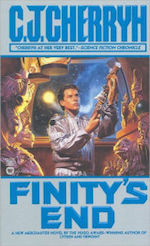 Recently named Grand Master Cherryh’s entire Merchanter series is the ultimate expression of stories about living and working in space, from the realities of cargo ships trying to turn a profit between the stars, to visceral details like condensation dripping off the ceiling of a docking corridor in a crowded space station. Finity’s End isn’t the best known of the Merchanter books, but it’s the first one I read and it particularly focuses on ship-board life through the eyes of a character who didn’t grow up on one of the family-dynasty space-faring ships that give the series its name. It’s a world that’s both strange and familiar: the concerns of time-dilated aging, next to the all-too real drag of working a shift in the kitchen.
Recently named Grand Master Cherryh’s entire Merchanter series is the ultimate expression of stories about living and working in space, from the realities of cargo ships trying to turn a profit between the stars, to visceral details like condensation dripping off the ceiling of a docking corridor in a crowded space station. Finity’s End isn’t the best known of the Merchanter books, but it’s the first one I read and it particularly focuses on ship-board life through the eyes of a character who didn’t grow up on one of the family-dynasty space-faring ships that give the series its name. It’s a world that’s both strange and familiar: the concerns of time-dilated aging, next to the all-too real drag of working a shift in the kitchen.
Leviathan Wakes by James S.A. Corey
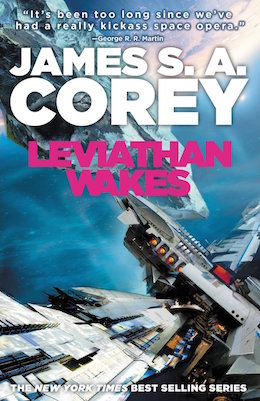 Like the Merchanter series, we might do well to consider the whole of the Expanse as one work. But Leviathan Wakes is the first. In Corey’s series, life in space has become common and comfortable enough that humanity has now brought politics into the black. This novel is concerned with labor movements, international relations, the fraught nature of the economics of scarcity, the tension of an arms race, and what happens when new technology and shocking events enter the mix. As something of a political thriller, the story seems familiar. But expanding that story throughout the solar systems makes it special.
Like the Merchanter series, we might do well to consider the whole of the Expanse as one work. But Leviathan Wakes is the first. In Corey’s series, life in space has become common and comfortable enough that humanity has now brought politics into the black. This novel is concerned with labor movements, international relations, the fraught nature of the economics of scarcity, the tension of an arms race, and what happens when new technology and shocking events enter the mix. As something of a political thriller, the story seems familiar. But expanding that story throughout the solar systems makes it special.
The Vor Game by Lois McMaster Bujold
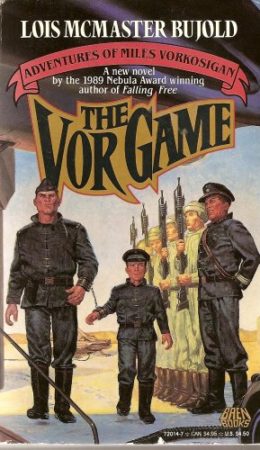 This is another series, the Vorkosigan saga, and one might argue that this far-future setting, crossing multiple solar systems, falls into the category of grand space opera. Except for moments like the ones that happen in this novel, which at times seems mostly concerned with the day-to-day operations of remote military bases, construction work on space stations, low-level space station jails, and ordinary ship operations. An adventure that spans multiple star systems must be classed as space opera, almost by definition. But Bujold never lets you forget about the hundreds of ordinary workers, bureaucracies, and mundane systems that keep that space opera chugging along.
This is another series, the Vorkosigan saga, and one might argue that this far-future setting, crossing multiple solar systems, falls into the category of grand space opera. Except for moments like the ones that happen in this novel, which at times seems mostly concerned with the day-to-day operations of remote military bases, construction work on space stations, low-level space station jails, and ordinary ship operations. An adventure that spans multiple star systems must be classed as space opera, almost by definition. But Bujold never lets you forget about the hundreds of ordinary workers, bureaucracies, and mundane systems that keep that space opera chugging along.
The Long Way to a Small, Angry Planet by Becky Chambers
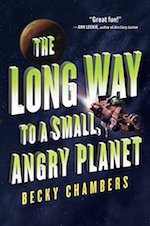 If you want aliens with your space routine, this is the book for you. Again, I might call this space opera because we have aliens, androids, and space empires in conflict with each other, all across the galaxy. Except our heroes are an ordinary (for this world, at least) crew of an ordinary ship, making the long journey to anchor the far point of a new wormhole gate. Most of the novel is about shipboard routine, which may seem wondrous to us, but to them is, well, ordinary. Reading this story was delightful.
If you want aliens with your space routine, this is the book for you. Again, I might call this space opera because we have aliens, androids, and space empires in conflict with each other, all across the galaxy. Except our heroes are an ordinary (for this world, at least) crew of an ordinary ship, making the long journey to anchor the far point of a new wormhole gate. Most of the novel is about shipboard routine, which may seem wondrous to us, but to them is, well, ordinary. Reading this story was delightful.
The Stars My Destination by Alfred Bester
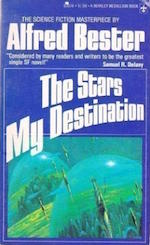 There’s nothing routine about Gully Foyle’s situation at the start of this book. On the surface, he’s not particularly hero material. He’s just a guy working on a ship, you know? But when that ship is destroyed, Foyle finds a way to survive in intact sections, sucking down dwindling air, scavenging drifting supplies, until he can find a way out. And that’s just where the book starts. Like all my favorite living-and-working-in-space stories, that Gully Foyle is in space in the first place is completely taken for granted. His situation is equivalent to an earth-bound sailor being washed up on a deserted island after a shipwreck. A common story of survival, yes? Of course it is. That’s the point.
There’s nothing routine about Gully Foyle’s situation at the start of this book. On the surface, he’s not particularly hero material. He’s just a guy working on a ship, you know? But when that ship is destroyed, Foyle finds a way to survive in intact sections, sucking down dwindling air, scavenging drifting supplies, until he can find a way out. And that’s just where the book starts. Like all my favorite living-and-working-in-space stories, that Gully Foyle is in space in the first place is completely taken for granted. His situation is equivalent to an earth-bound sailor being washed up on a deserted island after a shipwreck. A common story of survival, yes? Of course it is. That’s the point.
 Carrie Vaughn’s twentieth novel, Martians Abroad, about a teenage Martian who is sent to Earth for boarding school and isn’t happy about it at all, has just been released by Tor Books.
Carrie Vaughn’s twentieth novel, Martians Abroad, about a teenage Martian who is sent to Earth for boarding school and isn’t happy about it at all, has just been released by Tor Books.










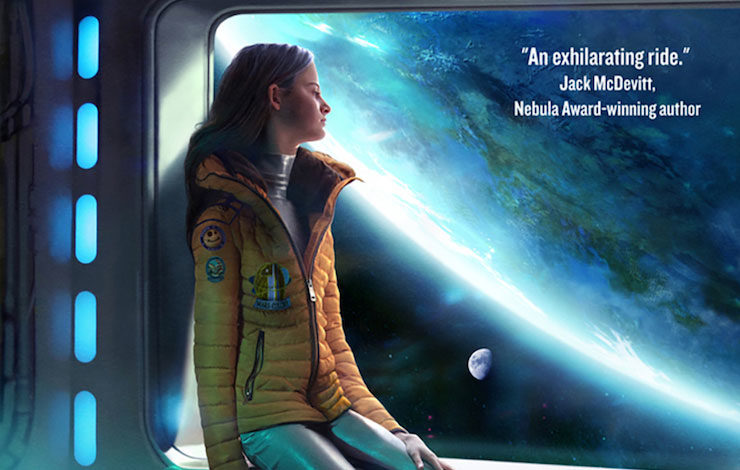
When 3 out of 5 recommendations are for Cherryh, Bujold, and Chambers, I’m feeling pretty confident about giving Carrie Vaughn’s new book a try. Well done. :)
This topic reminds me of the tor.com short story “On 20468 Petercook” by Andy Duncan; check it out in the archives if you haven’t already!
Finity’s End. I’ll have to look that one up. I loved Merchanter’s Luck back in the day. Sandor Kreja was somehow both a guy just trying to survive and a hero to me. Cherryh is such a good writer.
Anybody who has ever been to podiobooks knows this series, Golden Age of the Solar Clipper. First book is “Quarter Share”
The main character, Ishmael Horatio Wang, is orphaned on a corporately owned planet when his mother dies. As he’s 18 and not employed by the company, they’re going to kick him off and put him in massive debt for his ticket. He instead signs on as a deckhand for a merchant vessel, the solar clipper Lois McKendrick. The series then follows his rise through the ranks. The main conflicts arise from him adjusting from being a “landrat” to fitting in with “spacer” culture. Some of the best characters and character growth of any novel I’ve read in the past 10 years. I recommend the audiobooks, available for free through podiobooks.com, though it’s good in any version and available on his website: solarclipper.com
Love the Bester. Would have included something by Samuel Delaney. Try as I might I have never been able to get thru a Cherryh or Bujold book.
Allan Steele’s Near Space books would fit this list very well. Orbital Decay is about the people living and working in construction while in orbit.
I second tbgh’s recomendation. The Tales of the Golden Age of the Solar Clipper are a fantastic imagining of living and working between the stars. Worth checking out.
For Bujold, the soft entry is the novella Mountains of Mourning, which can be found in Bujold novella collections or free on the web (don’t tell anyone). Great character study of the main character of the Vorkosigan series.
For Cherryh, I love her Foreigner books but it is a deep slog to figure out what’s going on in the first book – easier to follow once you are in the second book and beyond. Perhaps start with Downbelow Station or especially Cyteen, which is my favorite single book of hers.
I would recommend The Highest Frontier by Joan Slonczewski, and also John Barnes’s excellent little masterpiece Orbital Resonance. The Becky Chambers is excellent, and I am looking forward to reading the Cherryh and Bujold. Thank you!
Not to sound like I’m copying the comment before me, but the Becky Chambers book really is excellent. Wow.